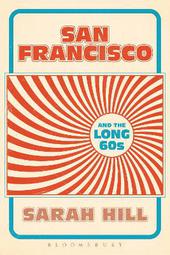
|
San Francisco and the Long 60s
Hardback
Main Details
| Title |
San Francisco and the Long 60s
|
| Authors and Contributors |
By (author) Dr. Sarah Hill
|
| Physical Properties |
| Format:Hardback | | Pages:376 | | Dimensions(mm): Height 229,Width 152 |
|
| Category/Genre | Theory of music and musicology
Rock and Pop |
|---|
| ISBN/Barcode |
9781628924206
|
| Classifications | Dewey:781.66097946109046 |
|---|
| Audience | | Professional & Vocational | |
|---|
| Illustrations |
46 bw illus
|
|
Publishing Details |
| Publisher |
Bloomsbury Publishing Plc
|
| Imprint |
Bloomsbury Academic USA
|
| Publication Date |
24 March 2016 |
| Publication Country |
United States
|
Description
San Francisco and the Long 60s tells the fascinating story of the legacy of popular music in San Francisco between the years 1965-69. It is also a chronicle of the impact this brief cultural flowering has continued to have in the city - and more widely in American culture - right up to the present day. The aim of San Francisco and the Long 60s is to question the standard historical narrative of the time, situating the local popular music of the 1960s in the city's contemporary artistic and literary cultures: at once visionary and hallucinatory, experimental and traditional, singular and universal. These qualities defined the aesthetic experience of the local culture in the 1960s, and continue to inform the cultural and social life of the Bay Area even fifty years later. The brief period 1965-69 marks the emergence of the psychedelic counterculture in the Haight-Ashbury neighbourhood, the development of a local musical 'sound' into a mainstream international 'style', the mythologizing of the Haight-Ashbury as the destination for 'seekers' in the Summer of Love, and the ultimate dispersal of the original hippie community to outlying counties in the greater Bay Area and beyond. San Francisco and the Long 60s charts this period with the references to received historical accounts of the time, the musical, visual and literary communications from the counterculture, and retrospective glances from members of the 1960s Haight community via extensive first-hand interviews. For more information, read Sarah Hill's blog posts here: http://blogs.cardiff.ac.uk/musicresearch/2014/05/15/san-francisco-and-the-long-60s http://blogs.cardiff.ac.uk/musicresearch/2014/08/22/city-scale/ http://blogs.cardiff.ac.uk/musicresearch/2015/07/21/fare-thee-well/
Author Biography
Dr Sarah Hill is a Senior Lecturer at the School of Music, Cardiff University, UK and Co-ordinating Editor of Popular Music.
ReviewsRefreshing, informative, and illuminating ... Hill deftly arranges her material to offer the reader an engaging and informative mosaic of narrative, memoir, opinion and argument ... An enjoyable and informative volume. * International Times * In this book Sarah Hill delivers a masterful study of a place often written about, and frequently iconized, as a heartland of the 1960s counter-culture but never portrayed with the level of micro-social detail offered here. In her accounts of the ordinary people whose lives both shaped and were shaped by the counter-culture, Hill enriches our understanding of how cultural memory is becoming increasingly central in the way that generations collectively appropriate and inscribe meaning in the objects, images and texts of contemporary popular culture. * Andy Bennett, Professor of Cultural Sociology and Director of the Griffith Centre for Cultural Research, Griffith University, Australia * Sarah Hill's new book offers a delightful panorama of countercultural San Francisco in the 1960s, studded with evocative quotes from historical and contemporary interviews with many of the principal players on the scene, and giving a special place to the musical achievements of many of the classic San Francisco bands. Her articulation of the 'long 60s,' reaching up to the present day, will resonate with countless fans, young and old, of that vibrant and precious time. * Graeme M. Boone, Professor of Music, The Ohio State University, USA * Sarah Hill is to be congratulated for her detailed exploration of the complex--and often turbulent--cultural history of San Francisco during the 1960s. She assesses and analyses the emergent counterculture's re-workings of music, art, theatre, sexuality and politics...the book is replete with information and insights that illuminate the events of the decade itself, and their continuing significance. * Ian Inglis, Visiting Fellow, Northumbria University, UK * This book provides an engaging, multi-layered account of the 1960s psychedelic counterculture in the Haight-Ashbury neighbourhood of San Francisco. Through in-depth archival research, textual analysis, and contemporary, first-hand interviews, Sarah Hill explores this countercultural moment in impressive and fascinating detail, while also tracing the ripples it generated and their enduring impact on contemporary US culture. By prioritising the many different voices and perspectives of those who participated in and contributed to the counterculture, Hill brings to life the events and characters involved. The accounts of journalists and hip press reporters, musicians and music critics, local residents and visitors provide rich insights into the counterculture and its enduring legacy, as does Hill's analysis of its sound recordings, guided tours, and memorabilia. The result is a book that questions dominant histories and understandings, and highlights the role and significance of cultural memory in popular music culture. The book will appeal to anyone interested in popular music, counterculture, and San Francisco. It will also provide a valuable resource for university students and scholars concerned with cultural history and historiography, cultural heritage and cultural memory; and with urban culture and the relationship between music and place. * Sara Cohen, Director, Institute of Popular Music, University of Liverpool, UK * It is a delight to see the musical tale go beyond the familiar rock bands to incorporate the work at the city's 'Tape Centre' and of Terry Riley, Steve Reich and John Adams...With an exhaustive bibliography, this is a fine book which first complements and then goes beyond earlier works by Selvin (1995), Perry (1984) and others. I was well disposed to the title before I opened the book, and I was not at all disappointed. It is very well written, and whether you know this period or not, its comprehensiveness and its sense of legacy make it highly relevant today. * Perfect Beat *
|